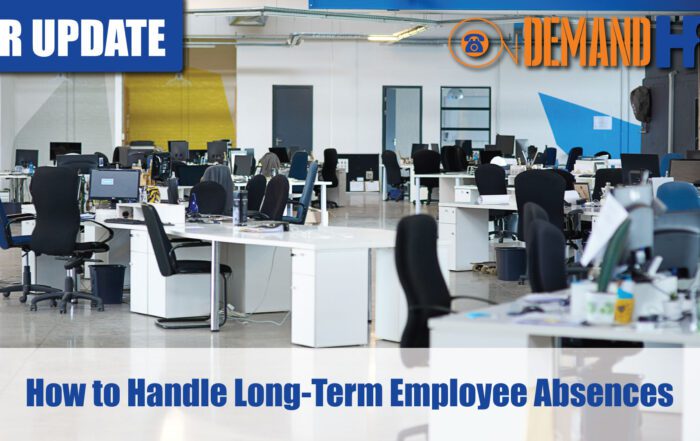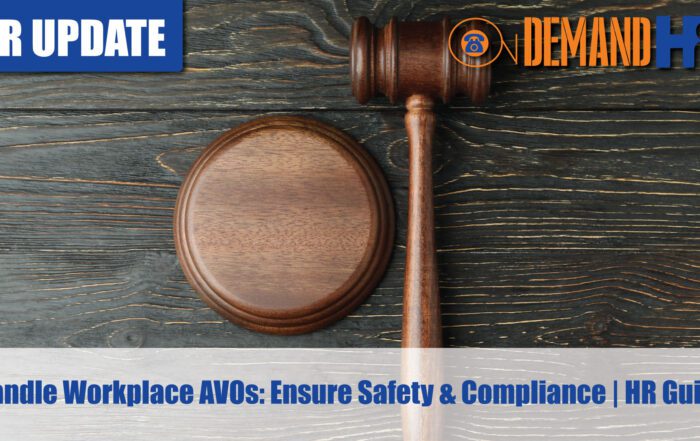Types Of Termination
In episode 11 of HR Friday’s Clint discusses probationary terminations, performance based terminations as well as termination for serious misconduct.
Please see below for a full transcript of the video
Share the HR or workplace relations challenge facing your business and one of our experienced consultants will be in touch within 24 hours with a strategic action plan or discover the best strategy yourself by accessing out free online training library.
Transcript
Clint Indrele 0:14
Good morning ladies and gentlemen. Welcome to another edition of HR Fridays I believe this is Episode 11 of our series which is friday every friday at 11:30am with On Demand HR My name is Clint Indrele Managing Director of On Demand HR. Every week. As you already know, we are going to present a specific topic of interest in the workplace relations or human resources space. Please let us know any comments you’ve got throughout the session. We’re happy to interact with you on any questions you’ve got and provide answers to those questions. The whole purpose of HR Firdays is to provide our clients, professional advisors and associate members with advice which is based on reality. We’ve been in the Fair Work Commission before we’ve conducted many workplace investigations, we’ve dealt with the Fair Work Ombudsman and other types of claims with Human Rights and Equal Opportunities Commission and so on. And we want to provide you with real perspective, not just theory and sometimes scare tactics that you do get from other advisors www.ondemandhr.com.au.
Clint Indrele 1:17
Today’s topic for everyone is various different types of terminations. So we’re going to talk about probationary terminations, we’re going to talk about performance based terminations. And then we’re going to close out the session with terminations that relate to serious misconduct. So without further ado, let’s get stuck into the presentation for today.
Clint Indrele 1:38
So we’ll start with probationary termination. So this is something that you know, quite regularly comes up with various different clients and other associates who ask questions about these things. Certainly, it is something that normally occurs when the employee is not right for the role and normally occurs very early in the piece. I think an important thing to remember is that there is some protections in the Fair Work Act that relate to the minimum employment period. So regardless of whether or not your employment contract has anything written in relation to probationary periods, or anything like that, the Fair Work Act provides a kind of a minimum employment period for the purposes of any unfair dismissal claims. So those minimum employment periods are as follows. So for 15 or more employees, the minimum employment period is six months. And for less than 15 employees, the minimum employment period is 12 months. So regardless of when what your employment contract says, on these particular matters, those are the minimum employment periods for unfair dismissal. So the bottom line is, if I have an employee who’s been employed for 11 months and 28 days, if we want to terminate their employment due to their due to whatever reasons, provided they’re not prohibited reasons, that person would not have the ability to bring an unfair dismissal claim against the business or organization. So it’s important to understand that that is something that, you know, applies to everyone. And that minimum employment is there regardless of whether there’s a contractual provision or not. Okay. The next thing we talk about though, is still observing some degree of procedural fairness, when you conduct a probationary or early termination. Now, a number of the considerations that we’d normally look at under Section 387 of the Fair Work Act that pertains to the procedure may not necessarily apply in an unfair dismissal, because obviously, this person, you know, may not apply to the situation because the person doesn’t have access to unfair dismissal. But there are other types of claims that we need to be aware of. And some of those claims relate to general protections disputes. So we must make sure that any, you know, any, any process that we conduct doesn’t give rise to a general protections dispute or claim in the Fair Work Commission, nor does it give rise to a discrimination claim. And typical things that we aske clients in this process is when they’re considering terminating a probationary employee, does the person has the person recently taken a period of sick leave? And is that in any way a motivation for the termination? Because theoretically, it should not be because that would be prohibited grounds for termination? Has the person commenced any worker’s comp claims recently? that could be a prohibited grounds for termination. Or has the person exercised a workplace complaint? or exercise any other workplace right? that ultimately, we are motivated to terminate that employment based on. So we must not be motivated to terminate anyone’s employment regardless of what length of period of time based on what is a prohibited ground and those three things workers comp claims, sick leave complaints are all examples of those types of things. The other thing we can’t terminate employment for is obviously discriminatory grounds. So of course, I think most of you are aware of the usual discriminatory your grounds like race, you know, sex, color, disability, all of those sorts of things. And obviously, we want to avoid any terminations that might be wholly or partially motivated by those situations. So, again, that’s just a bit about early terminations and probations. But if you don’t have any of those risk factors, generally probationary or early terminations are relatively simple. And generally speaking, as long as there’s a performance basis for that termination or conduct basis for that termination, those terminations are generally pretty sound. And there’s generally no basis for an individual to challenge such termination. But again, if you’re not sure, seek further advice on these particular issues.
Clint Indrele 5:31
We’ll move on to performance based terminations. I guess this is more the type of termination that occurs when the employee has passed the minimum employment period for unfair dismissal. So they may have access to unfair dismissal. But we’re still not satisfied that they’re carrying out the role to the required standard. So typically, in this situation, once the employee gets past that six months or 12 month period, if it’s performance based, we generally would say it’s difficult to justify termination without at least one warning. And that is reiterated in Section 387 of the Fair Work Act, which talks about that a person must be warned prior to be being terminated for performance reasons. Again, when we’re looking at warning a person, we must be clear about what’s expected and provide a reasonable opportunity to improve. That doesn’t mean that the opportunity to improve has to be particularly lengthy. We talk to a lot of clients about employees that might be employed for, you know, just over the six months or just over the one year mark and say, Look, if the performance is not to the required standards, then ultimately, a performance warning outline the issues, give an opportunity to improve of a few weeks, if the performance still hasn’t improved. Consider termination, you certainly don’t do not have to go through, you know, three written warnings, as we dealt with in one of our earlier presentations about that being a bit of an urban myth in the in the world of HR. The main thing to consider, though, is that, obviously the length of service is going to play a factor in how long the performance management process needs to occur for if a person has been there for 10 years, well, then one written warning and terminating a few weeks later is probably not going to suffice, it’s probably going to need to take a little bit longer. And so length of service is important in those those considerations, in terms of an opportunity respond that is also important. So it’s about providing someone with natural justice, giving them a chance to respond to any things that we’re considering in terms of why we might be terminating their employment or why we’re not satisfied with their performance. So those are very important things to be doing in any kind of performance discussions, always giving the employee a chance to respond and to provide feedback on, you know, mitigating factors, or how we should consider these things as an employer. So that’s a little bit about performance based terminations. Again, these things can happen in a manner which is relatively swift, it doesn’t necessarily need to be dragged on for an extended period of time. The number of warnings again, depends on length of service. And ultimately, you just have to, you have to look at these circumstances on their merits. So again, need further advice, have a look at our website, we’ve got resources there, but also can talk to you talk you through these things. also.
Clint Indrele 8:09
Let’s move on to serious misconduct. So these situations are quite rare, we are talking about things which are sometimes almost even at a criminal standard. We’re talking about behavior, which is either and just looking at the Fair Work Act definition behavior, which is either willful or deliberate, that is inconsistent with the continuation of the contract of employment, conduct that he causes series or imminent risk to the health and safety of a person, or causes immenent risk to the reputation viability or profitability of the employees business. And some examples of this are theft, fraud, assalt, under the influence of drugs and alcohol, although that even of itself doesn’t necessarily warrant termination in first instance, or any other kind of situation where the employee refuses to carry out on lawful reasonable instructions. So looking at serious misconduct, look, there, there is a number of situations where this can occur. And I think that sometimes the typical employer thinks that things may be more serious than what they are in trying to use this type of termination to get an outcome or to, you know, as a means to an end. So I think this is really reserved for situations that are so serious on their own that warrant termination. so in this situation, again, due process is still required. So even if it is the most blatant or most straightforward theft, fraud or assault, that doesn’t provide the employer with an excuse to have a quick and lazy process to conduct a termination like this, again, the employee should be subjected to the same sort of procedural requirements as would apply in any other termination.
Clint Indrele 9:57
I’ll just quickly go on to the next slide which gives us a bit of insight as to what that is. So, again arrange to meet with the employee allow them to have a support person present, be clear on the allegations of serious misconduct. So this is most important in terms of serious misconduct terminations, you must be clear on what the allegations are, be prepared to provide supporting information evidence where that is appropriate. And you might also even need to think about suspending an employee prior to termination. And you might even need to conduct an investigation prior to even having that meeting with the employee. So sometimes in serious complaints, we have a period of 2,3,4 could be even sometimes six weeks where the employee might be on suspension at full pay while an investigation is going on. I mean, obviously, the shorter the better. But ultimately, sometimes these things take time, I recently completed a very complex investigation involving two complainants, two different respondents, which went on for quite a long time. So I believe there was an employee in that situation that was suspended for a period of around about six, seven weeks. So again, those things are all entirely possible in these situations, take time to consider the employees responses and allow the employee of course, an opportunity to respond to the allegations, either during the investigation or at the conclusion of the investigation. I mean, ultimately, the employee who is the accused should always be included in the investigation of any issues, make a decision on the matter ultimately at the end and provide the employee with a letter outlining the basis for that decision to terminate for serious misconduct. Again, section 387 of the Fair Work Act requires that we clearly articulate what those reasons are for termination in order to meet those key requirements, that the Commission will can see that if there is an unfair dismissal. So that’s a little bit about the termination process. And I think that it’s very important. I’ll just go back to one point I made a couple of minutes ago that it doesn’t matter how serious the matter is, or how straightforward or how black and white the evidence might be, the process is still very important before that decision is made, just because the evidence is black and white, it doesn’t give you the right to make the decision without the employer responding and a simple procedural failure like that could result in an unfair dismissal, or potentially another type of cliaim, depending upon the circumstances. So that’s a little bit about terminations today.
Clint Indrele 12:26
So I hope that yeah, that’s given everyone a bit of an insight into, you know, how you might look at different types of terminations. So just very quickly, recapping, probationary terminations, quick, straightforward. And again, without necessarily any warning, provided there’s no prohibited grounds, performance based terminations, when we’re talking about someone who’s gone above that six months or 12 months minimum employment period, you know, probably at least one morning required, maybe more. But again, no need for those things to drag on set, expectations around improvement, give a reasonable time to improve but not necessarily a lengthy period of time to improve, to see ultimately to make a final decision about the ongoing employment and whether it’s going to work out in the long run. And finally, serious misconduct where again, we have a situation where the conduct is very serious on its own to potentially justify dismissal. But even if the evidence is black and white, not to, you know, take shortcuts around the process and make sure you still have a robust process prior to termination. So that’s it for today. So if you’ve got any questions on this topic, feel free to comment in the comments box, we will get back you with any thoughts that we’ve got on those particular situations. Once again, my name is Clint Indrele, Managing Director of On Demand HR if you’ve got any, if you want to know more about our services, www.ondemandhr.com.au. And we look forward to your company again on another HR Fridays next week. Have a great weekend. Bye for now.






